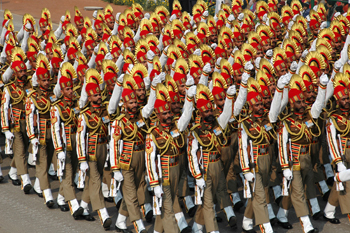INDIAN ARMED FORCES CHIEFS ON
OUR RELENTLESS AND FOCUSED PUBLISHING EFFORTS

SP Guide Publications puts forth a well compiled articulation of issues, pursuits and accomplishments of the Indian Army, over the years

I am confident that SP Guide Publications would continue to inform, inspire and influence.

My compliments to SP Guide Publications for informative and credible reportage on contemporary aerospace issues over the past six decades.
- Interim Defence Budget 2024-25 — An Analysis
- Union Defence budget 2024
- Indian Army: In quest of greater firepower and policy recommendations for gaps
- Indian Army Annual Press Conference 2024
- 6G will transform military-industrial applications
- Tata Boeing Aerospace Delivers 250 AH-64 Apache Fuselages, Manufactured in India
OROP: One-Man Judicial Commission
 |
By Lt. General P.C. Katoch (Retd) Former Director General of Information Systems, Indian Army |

Border Security Force Marching Contingent passes through the Rajpath during the Republic Day Parade
Politicization of the unfortunate suicide of Subedar Ram Kishan Grewal was indeed bad. The JCO's suicide note reportedly stated he was taking that drastic action not having been given the benefit of OROP. Delhi Chief Minister declared Subedar Ram Kishan Grewal as 'martyr' and announced a compensation of Rs one crore to his next of kin. The media attributed the delay in award of OROP to Subedar Ram Kishan to the pension disbursing authority (PDA), which in case of the JCO was the branch of State Bank of India having his pension account. The media also quoted the Defence minister saying, "Only one lakh ex-servicemen out of over 20 lakh are not getting pension as per the OROP scheme due to some technical difficulty or documentation problems." The JCO had served for six years in the Territorial Army and his balance service in the Defence Security Corps. So Subedar Ram Kishan Grewal perhaps was one of those unlucky one lakh veterans who despite considerable elapse of time had not received OROP.
It is also possible that the instructions issued to PDAs by the CDA were not comprehensive enough to deal with such cases. When the government announced OROP in 2015, it was protested by military veterans for not being what the Koshiyari Committee had recommended to be restored. In December 2015, the government appointed the one-man judicial commission headed by former justice L Narasimha Reddy (henceforth called Reddy Commission) vide MoD (DESW) Notification No. 12(01)/2014-D(pen/Pol)-Part-II dated 14 December 2015 to look into the anomalies of the One Rank, One Pension (OROP) that had been sanctioned by the government, which was protested against by military veterans.
The terms of reference given to Reddy Commission were to examine and make recommendations on references received from the Central Government on following matters:
- Measures for the removal of anomalies that may arise in implementation of the OROP Letter No. 12(1)/2014/D(Pen/Pol)/Part-II dated 7.11,2015;
- Measures for the removal of anomalies that may arise out of inter-service issues of the three forces due to implementation of OROP order ibid;
- Implications on service matters, and;
- Any other matter referred by the Central Government on implementation of the OROP related issues.
The notification required the Committee to make its recommendations within six months of the date of its constitution and if necessary, make interim reports on any of the matters mentioned in the terms of reference. While the office of the Reddy Commission was set up at New Delhi vide the above letter, how it wanted to go about was left to the discretion of the said Commission. All the expenses as per the government letter were to be borne by the DESW — read from the Defence Budget. The Reddy Committee decided upon meeting veterans in 23 cities pan India. This schedule may have been chalked out by or in consultation with the DESW. Why 23 cities is anybody's guess but but perhaps the number of cities had something to do with the Commission not being able to submit its report within the specified deadline of six months. Whether any interim reports were submitted to the government is not known tenure of the Reddy Commission was extended by another three months. During the meeting with military veterans at Dehradun, Reddy informed the audience about his visit to 'char-dham yatra' and expressed his gratitude to 'Devbhoomi' saying, "It is my personal feeling that the central government was to rethink on issues relating to the anomalies of OROP".
It was heartening for the veterans to hear this, which indeed would have been the intent of the political authority. But the main bone of contention is the definition of OROP, which applied correctly would lead to yearly actualization of pension as was in vogue prior to 1973, instead of the five-yearly revision that has been applied while sanctioning OROP; five-yearly revision results in One Rank, Many Paensions. Ironically, the definiton of OROP was excluded while spelling out the terms of reference for the Reddy Commission, which apparently was by design — beaucratic mischief. It is also quite possible that bureaucrats would try to confuse the issue of OROP further with the enhanced pension that has come into force since early 2016. But while enhanced pension somewhat reduced shortfall in pension, as compared to recent retirees, the gap has certainly nowhere eliminated. This is why military veterans are continuing to protest for not having been given full OROP, as was promised. OROP predominantly affects soldiers, officers being just one percent. The Reddy Commission submitted its report to the government two days before Subedar Ram Kishen Grewal committed suicide. But since the definition of OROP was excluded for the terms of reference, the recommendations of the Commission are not difficult to guess. Significantly, the 7th CPC has already granted OROP to civil servants. It would be therefore prudent for the government to announce its decision on the Reddy Commission, rather than keeping it in the freezer.
Photo Credit: PIB





